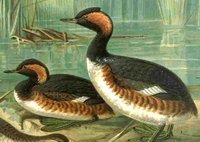Black-necked Grebe
|
|
| Black-necked Grebe/Eared Grebe | ||||||||||||||
|---|---|---|---|---|---|---|---|---|---|---|---|---|---|---|
 | ||||||||||||||
| Scientific classification | ||||||||||||||
| ||||||||||||||
| Binomial name | ||||||||||||||
| Podiceps nigricollis Brehm, 1831 |
The Black-necked Grebe, Podiceps nigricollis †, is a member of the grebe family of water birds. It is known in North America as the Eared Grebe.
It breeds in vegetated areas of freshwater lakes across Europe, Asia, Africa, northern South America and southwest and west United States.
Like all grebes, it nests on the water's edge, since it legs are set very far back and it cannot walk well. Usually two eggs are laid, and the striped young are sometimes carried on the adult's back.
It is an excellent swimmer and diver, and pursues its prey underwater, eating mostly fish as well as aquatic insects and larvae. It prefers to escape danger by diving rather than flying, although it can easily rise from the water.
The Black-necked Grebe is 28-34 cm (12"-14") long. The adult is unmistakable in summer with a black head and neck and yellow ear tufts. In winter, this small grebe is white with a poorly defined black cap, which distinguishes it from the crisper-looking Slavonian Grebe.
In courtship the male offers the female a mellow poo-ee-chk.
Folk names: eared diver.
† podiceps: Latin for podicis (rump) and pedis (foot), referring to the placement of the legs on its body; nigricollis: Latin for niger (dark or black) and collum (neck).
